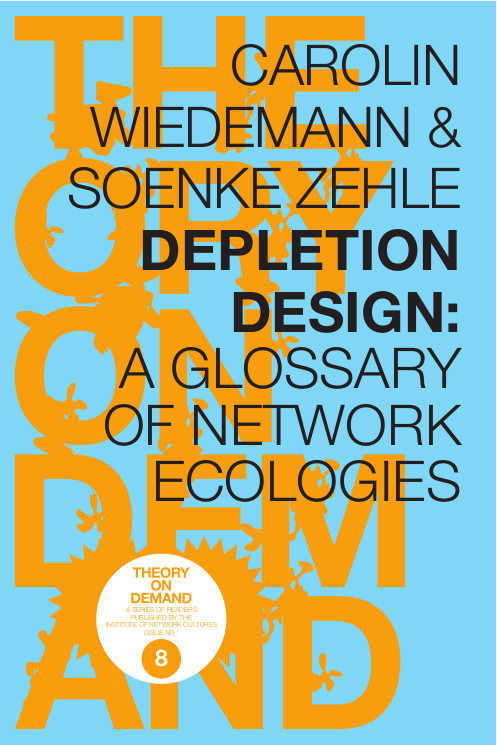Carolin Wiedemann, Soenke Zehle (eds.): Depletion Design: A Glossary of Network Ecologies (2012)
Filed under book | Tags: · algorithm, anonymous, architecture, biopolitics, commons, creative industries, cyborg, design, ecology, hackerspace, media ecology, network ecology, networks, politics, remix, software, spam, technology, theory

“Depletion Design suggests that ideas of exhaustion cut across cultural, environmentalist, and political idioms and offers ways to explore the emergence of new material assemblages. Soenke Zehle and Carolin Wiedemann discuss Depletion Design with Marie-Luise Angerer, Jennifer Gabrys and David M. Berry, inviting tm13 participants into a collaborative reflection on the necessity to understand human beings as one species among others – constituted by interactions of media, organisms, weather patterns, ecosystems, thought patterns, cities, discourses, fashions, populations, brains, markets, dance nights and bacterial exchanges (Angerer); on the material leftovers of electronics as provocations to think through and rework practices of material politics that may be less exploitative within our natural-cultural relationships (Gabrys); and on lines of flight from and through the computational – about expanding them into new ways of living beyond current limitations and towards new means of judgment and politics (Berry).
We, or so we are told, are running out of time, of time to develop alternatives to a new politics of emergency, as constant crisis has exhausted the means of a politics of representation too slow for the state of exception, too ignorant of the distribution of political agency, too focused on the governability of financial architectures. But new forms of individual and collective agency already emerge, as we learn to live, love, work within the horizon of depletion, to ask what it means to sustain ourselves, each other, again. Of these and other knowledges so created, there can no longer be an encyclopedia; a glossary, perhaps.”
Contributors: Marie-Luise Angerer (Cyborg), Franco ‘Bifo’ Berardi (Exhaustion, Soul Work), David M. Berry (On Terminality), Zach Blas (Queer Darkness), Drew S. Burk (Grey Ecology), Gabriella Coleman (Anonymous), Heidi Rae Cooley (Ecologies of Practice), Sebastian Deterding (Playful Technologies, Persuasive Design), Jennifer Gabrys (Natural History, Salvage), Johannes Grenzfurthner & Frank A. Schneider (Hackerspace), Eric Kluitenberg (Sustainable Immobility), Boyan Manchev (Disorganisation, Persistence), Lev Manovich (Software), Sonia Matos (Wicked Problems), Timothy Morton (Ecology without Nature), Jason W. Moore (Crisis), Anna Munster (Digital Embodiment), Eduardo Navas (Remix[ing] Re/Appropriations), Brett Neilson (Fracking), Sebastian Olma (Biopolitics, Creative Industries, Vitalism), Luciana Parisi (Algorithmic Architecture), Jussi Parikka (Dust Matter), Judith Revel (Common), Ned Rossiter (Dirt Research), Sean Smith (Information Bomb), Hito Steyerl (Spam of the Earth)
Publisher Institute of Network Cultures, Amsterdam, Dec 2012
Theory on Demand series, 8
Creative Commons Attribution-NonCommercial-ShareAlike 3.0 Netherlands License
ISBN 9789081857512
via jussiparikka.net
PDF, PDF (updated on 2015-7-9)
Comment (0)Google Search Quality Rating Guidelines (2007-2012)
Filed under handbook | Tags: · algorithm, google, labour, search, software, software studies, spam, web
Google’s manual for its unseen humans who rate the web. The raters are being hired through Google’s contractors such as Lionbridge, Leapforce and Appen Butler Hill.
Publisher Google, Inc.
43 pages; 125 pages; 161 pages
via Google Search
interview with a Google Search quality rater (searchengineland.com)
discussion (Slashdot)
commentary (v.3.27, searchengineland.com)
commentary (v.3.18, searchenginewatch.com)
commentary (v.2.1, searchengineland.com)
PDF (Version 3.27, June 2012)
PDF (Version 3.18, March 2011)
PDF (Version 2.1, April 2007)
Vito Campanelli: Web Aesthetics: How Digital Media Affect Culture and Society (2010)
Filed under book | Tags: · aesthetics, computing, digital media, internet, media, media culture, memes, networks, new media, remix, spam, subjectivity, technology, theory, virus, web

“We live in a world of rapidly evolving digital networks, but within the domain of media theory, which studies the influence of these cultural forms, the implications of aesthetical philosophy have been sorely neglected. Vito Campanelli explores network forms through the prism of aesthetics and thus presents an open invitation to transcend the inherent limitations of the current debate about digital culture.
The web is the medium that stands between the new media and society and, more than any other, is stimulating the worldwide dissemination of ideas and behaviour, framing aesthetic forms and moulding contemporary culture and society.
Campanelli observes a few important phenomena of today, such as social networks, peer-to-peer networks and ‘remix culture’, and reduces them to their historical premises, thus laying the foundations for an organic aesthetic theory of digital media.”
Publisher NAi Publishers, Rotterdam; in association with the Institute of Network Cultures at the Hogeschool van Amsterdam, University of Applied Sciences, October 2010
Studies in Network Cultures series
ISBN 9056627708, 9789056627706
276 pages
Reviews: Greg J Smith (Rhizome, 2011), Alessandro Ludovico (Neural, 2011), Regine Debatty (We Make Money Not Art, 2011).
Book website
Interview with the author (Geert Lovink)
Interview with the author (Pasquale Napolitano, Digicult)
PDF, PDF (25 MB, updated on 2019-3-24)
Comments (7)
